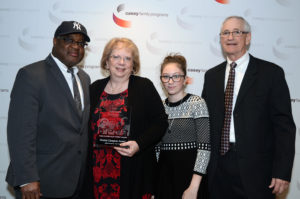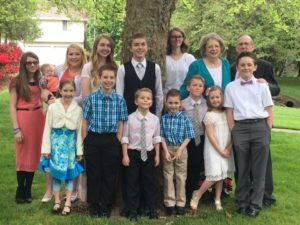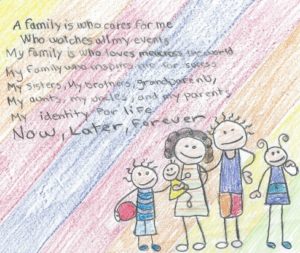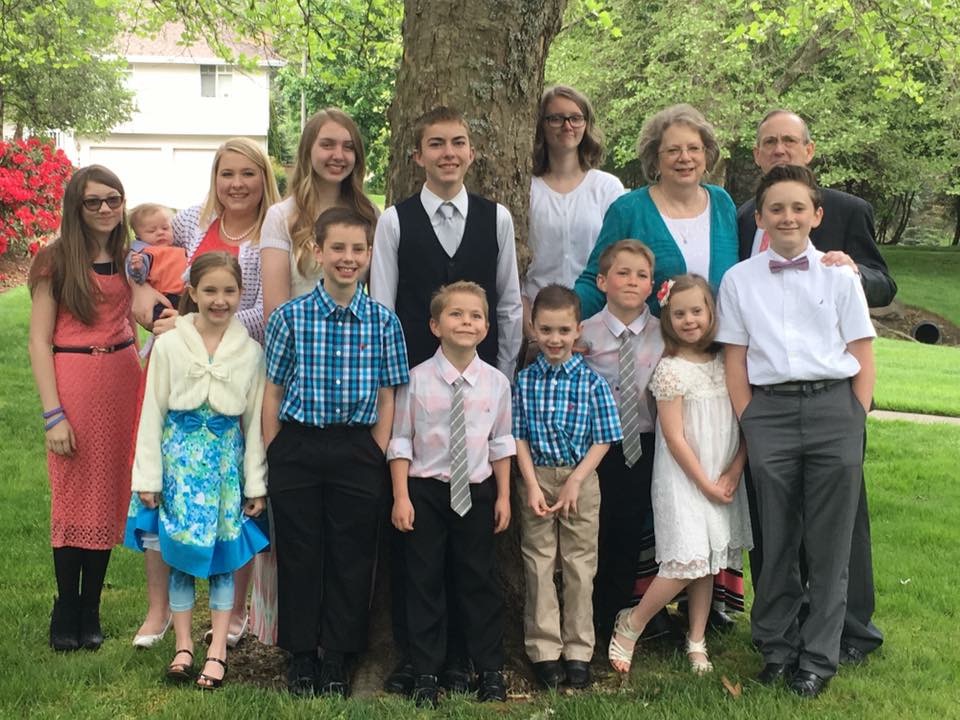There are some people you meet who you can tell were made for their job. Lynn Urvina is one of those people. She works as the Kinship Navigator for Family Education and Support Services, and she recently won the Kinship Caregiver Award for the 2018 National Casey Excellence for Children Awards.
![]() As a Kinship Navigator, Lynn supports caregivers, often grandparents, but sometimes aunts, uncles or older siblings raising children whose biological parents are otherwise unable to care for them. She knows what its like to be a kinship caregiver, because she has raised her own 14-year-old granddaughter Tara from the time she was 11 months old.
As a Kinship Navigator, Lynn supports caregivers, often grandparents, but sometimes aunts, uncles or older siblings raising children whose biological parents are otherwise unable to care for them. She knows what its like to be a kinship caregiver, because she has raised her own 14-year-old granddaughter Tara from the time she was 11 months old.
“One part of our story that’s different is that we didn’t know she was born until she was 11 months old,” shares Lynn of her granddaughter. “We started offering to watch her as much as we could. Even our older daughter offered to watch her occasionally.”
By the time Tara was a year old, she was living with her grandparents fulltime.

Lynn and her husband Lars started with custody through the court system, then officially adopted Tara when she was 8-years-old. “We always wanted to adopt, but we weren’t going to do that until both parents agreed,” says Lynn.
With four adult children now out of the house, Lynn and her husband Lars raised Tara as an only child. “Our older children are now her siblings, and her parents have gone on to have other kids,” Lynn shares. So including adopted and half-siblings, Tara has nine siblings, another unique feature of their family story.
Lynn has a big family, with 14 grandchildren – 15 if you include Tara – and one great-grandson. She is glad to have most of her family living within the state. She says the grandkids love getting together often, and that her adult children are best friends. “They have been very supportive of us raising Tara, and have been a great support since my husband passed away last May.”
“I’m sad when I see other people in similar situations to mine, and they don’t have that same support. I ask, ‘Who can watch your kids so you can have a weekend to yourself?’ And they don’t have anybody.”
That’s why her work as a Kinship Navigator for FESS is so important, because grandparents and kinship caregivers need that support. “A lot of people don’t realize, first of all, how many others are in the same situation, how common it is. That there are places they can turn for help.”
If a family is dealing with the court system, or Child Protective Services, then Lynn can assist them, answer questions or refer them to someone else who can offer legal support.

According to Lynn, grandparents get state support for raising grandkids only if they are already low income. But there is not the same level of support for kinship caregivers as there is for registered foster parents. And for every one child in the foster care system, there are eight children being raised by a relative outside of foster care, in what is called the “informal system.”
“Sometimes the kids literally come with the clothes on their back,” says Lynn. “So that’s hard for someone all of a sudden to think – I need to get them clothing, or they need school supplies, all the things that families usually build up over time.” The Kinship Program can assist with supplying necessities, as well as purchasing expensive items such as car seats or bunk beds.
“I often see older folks who should be spending their money on medications, or keeping money in their retirement account, and they’re not, because they’re buying tennis shoes and paying for their grandson’s football fees,” she shares. “I try to help them realize that sometimes those fees can be waived. But they don’t always know to ask.” So Lynn is there to let them know there are ways for them to get the support they need to take care of their kids.
“Support sometimes can be financial, but sometimes it’s emotional,” Lynn acknowledges. Caregivers can find that kind of emotional support in FESS education and support groups, called Kinship Conversations, which meet in Thurston, Mason and Lewis Counties.
Ten years ago, Lynn was an attendee of one of those kinship support groups. And it was through that connection that she first heard about the open Kinship Navigator position, and was soon hired.

Since then, Lynn has helped many local families, and she’s even advocated to state and national legislators for programs that support kinship. Lynn’s overall goal for the Kinship Program is to grow more respect for the families that are stepping up to raise grandchildren, and less judgment about their parenting skills.
“I want to help the community to realize, you probably know somebody that’s raising a relative’s child. How are you helping them? Are you offering support, are you offering to take that child to the movie or park, so that grandma and grandpa can go out?” Even if it’s just offering encouragement to a friend or neighbor, there are many ways to support a kinship caregiver.
If you know a kinship caregiver, or are one, be sure to check out one of Lynn’s favorite programs, the 15th annual Voices of Children Contest: a positive outlet for children being raised by relatives to submit art or writing about their experience. Contestants and their families celebrate the winners every year at the governor’s mansion.
To learn more about the kinship programs that Family Education & Support Services have available, head to the website.



















































